SQL is well-suited for professionals aiming to build careers as DBAs, software engineers, financial analysts, and more.
Many industries rely on relational databases to manage their data and make predictions. For example, a retail company may have a table for every customer, for every purchase made, and for every item in stock.
Through unique identifiers, such as a customer or item ID, multiple tables can relate to one another. With relational database management (RDMS) systems and SQL, those tables’ connections can help provide valuable insights. For example, which customers are purchasing the highest volume of a product? What time of year are certain products in demand?
SQL can be more intuitive and easier to learn than more complex data analytics languages. It is used in industries ranging from finance to music and can be a requested skill for roles that manage and interpret data.
Goal of Course
- Building Tables
- Designing Relational Schema
- Creating Indices
- Implementing views
- Ensuring data integrity
- Writing queries to fatch data
Key Modules
- MS Excel Formulas
- Data Summarization with Pivot
- MIS Reporting with MS Excel
- Understanding of VBA/Macro Programming










